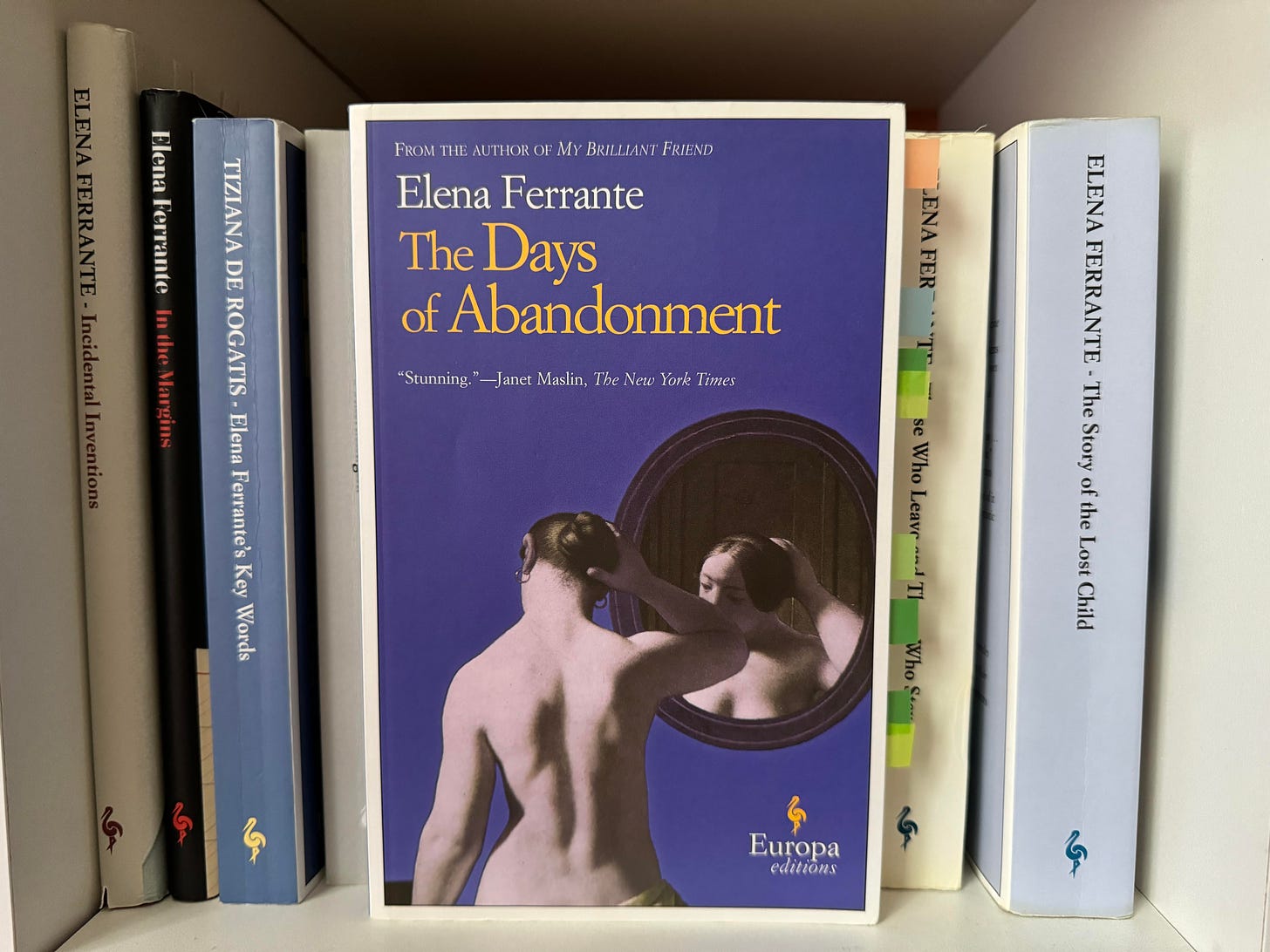Salutations, bibliophiles.
Today, I’m very excited to bring you
.Kolina writes
, where she discusses books, reading habits, and anything pertaining to literature.Here, Kolina shares with us the book that made her — The Days of Abandonment by Elena Ferrante. Enjoy!
I have known since an early age that I wanted to be a novelist. At age eight, for a school assignment, I wrote down the following goals:
I want to publesh 6 books.
I want to right 20 books.
I want to be better at righting.
I wrote the goals backwards. Becoming better at writing is the obvious goal to begin with. Fortunately for that eager eight year old, as I grew, so did my writing skills. I was a terrible test taker – a teacher I respected once told me so – but I could write. In middle school for some perverse assignment, we had to write pretend eulogies and then get up in front of the class to read them. I wrote mine about my mother. After class, the teacher pulled me aside and asked if my mom was actually dead.
No, teacher, I just understood the assignment.
While I could write essays and made-up eulogies, I struggled with my fiction. I got a C- in my fiction writing class in undergrad because I wrote a poem about the Grateful Dead. My teacher was not amused. I don’t think she should have punished me so severely, though, because what I was doing was experimenting; I was searching for my voice. As much as a teacher can offer guidance, it is up to the writer to find her singular way of expression, and in that fiction course, I was ideating.
It would be another 12 years until I read a book that changed everything for me.
In 2019, I picked up Elena Ferrante’s The Days of Abandonment – and it clicked. All the classes I took, all the short stories I wrote, the 50,000-word novel I wrote in a month and swiftly shelved – it all clicked. The Days of Abandonment revealed to me the kind of voice I love: gritty and occasionally grotesque; candid and direct. Stories of women, strong and gutsy, thrown into messy situations, climbing themselves out on their own accord and in their own ways. That was it – that was the story I wanted to tell and the way in which I wanted to tell it.
The Days of Abandonment follows Olga, a mother of two and wife of 15 years to a husband who announces abruptly over dinner that he is leaving her. The book covers those hazy days of frenetic grief. It’s an uncomfortable read, and yet while reading it, I knew I was in exactly the right place.
“I thought about it night and day and meanwhile, a prisoner of my thoughts, I neglected myself, I didn’t comb my hair, or wash.”
― Elena Ferrante, The Days of Abandonment
I went on to read everything Ferrante has written – the Neapolitan Quartet, her early novels, every essay, even her children’s book – and deeper into the dark, beautifully constructed well I dove. Contemporaneously, I began to write with more focus. I started to write with a frankness I’d never before put on paper. I penned a short story, and for once, I didn’t hate it. I brought the short story to a fiction writing workshop and the teacher told me she wanted to see it become a novel.
I read more Ferrante. I expanded my short story. I learned how to use turns of phrases that left readers ill at ease but wanting to read more. I studied Ferrante’s literary devices, learning from the pages within her novels about first-person point of view and unreliable narrators.
“I am the queen of spades, I am the wasp that stings, I am the dark serpent,” Ferrante says in The Days of Abandonment. “I am the invulnerable animal who passes through fire and is not burned.”
I became the queen of spades; the heroine of my own life. As my short story grew, so did my collection of Ferrante books. The Days of Abandonment remains the novel I’ve read the greatest number of times. It’s the title I reach for when I’m looking for an example of the great portrayal of grief, or of deep interiority, or of beautiful words strung together to create ugly meaning.
In Frantumaglia: A Writer’s Journey, Ferrante says, “Right from the first lines, I strive to establish a tone that is placid but with unexpected wrinkles.”
That was it – a map for me to reach my voice. My expanded short story now became a novel, now something with emotional heft, something I liked. My protagonist became three-dimensional, a complex woman who breaks outside of the structure of what a woman “should be.”
The Days of Abandonment didn’t just help me find my voice; it helped me find myself. Writing is an exercise in expression. Even fiction is a portrait of what an author cares about. Elena Ferrante in general, and this book in particular, showed me the way to my craft, to my literary agent, to my (hopeful) publication.
This great pseudonymous author – one of the very best writers of our time – has said she’s deeply inspired by Elsa Morante. I am deeply inspired by Elena Ferrante. Maybe one day, a new writer will find her voice after reading me. But in the meantime, I read Ferrante, I luxuriate in her brusque writing, and I revel in the discovery of the one thing a writer needs: her voice.
P.S. For more ways of getting your writing in front of new readers, consider becoming a paying subscriber today.







I love Elena Ferrante. The Prodigious Friend is my favorite book series, highly recommend it
I already knew I was missing out when it comes to Elena Ferrante - this has given me the kick to actually read her!